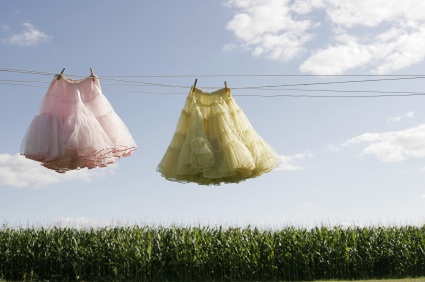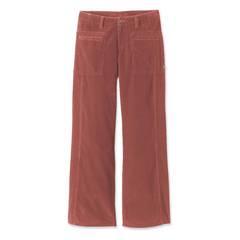How to Make Your Own Laundry Products
Posted on April 15, 2011 by
Please welcome today’s guest poster, Bailey Harris.
Since clean laundry is pretty much a necessity, we pay high prices for laundry detergents, fabric softeners and stain removers. Many people don’t realize that simple, reasonable ingredients can be purchased to make your own laundry products. Most of the time, these ingredients can be found at the same stores as your favorite detergents, fabric softeners, and stain removers, at a fraction of the cost.
Laundry Detergents
There are tons of different laundry detergents on the market today. Some people like liquid, some prefer powder. Prices vary too, but none are very economical. Especially in households with large families and kids, the amount of laundry detergent used in any given week or month is crazy. Just imagine what those households are paying in laundry costs.
Many recipes exist for making your own laundry detergent. All of them basically contain the same ingredients; it’s the amounts that vary. Whether you prefer powder or liquid can also change the ingredients slightly.
A simple recipe for powdered laundry detergent uses 1 bar of soap (Ivory works well, but any will do), 1 cup of borax, and 1 cup of washing soda. Grate the bar of soap into a large bowl. A cheese grater works well for this. Add the borax and washing soda to the bowl of grated soap. Stir well for 5 minutes until a fairly uniform powder forms. It’s as easy as that. Keep your detergent in a plastic container with a lid. A 32-ounce yogurt or margarine container works well. Using 1 to 2 tablespoons per load, depending on your needs, should get you through 32 to 64 loads of laundry.
If liquid detergent is more your style, you can try this recipe. All you need is 1 cup of washing soda, 1/2 cup of borax, and 1 bar of soap (grated). You will also need 4 cups of water and 3 gallons of warm water, divided. Additionally, a large container with a lid, such as a 5 gallon bucket, will be needed for mixture and storage. First, boil the 4 cups of water in a large saucepan. Once boiling, reduce heat to medium to keep a simmer. Add the grated bar of soap to the water, a little at a time, and stir well until dissolved.
Meanwhile, pour your 3 gallons of warm water into the bucket. Add the soapy water mixture to the bucket and stir. Then add your washing soda and borax, stirring very well until dissolved. Once everything is mixed well, cover your bucket and let things sit for 24 hours, then your detergent will be ready to use. The consistency may vary, depending on the soap used and minerals in your water. Whether your detergent is gel-like, watery, or very much like normal detergent, it’s just fine to use. Give things a good stir before each use and use about 1 cup per load.
Fabric Softener
Although not necessary, many people choose to use a fabric softener when doing laundry. It gives clothes a soft, lofty feel and reduces static cling. It can also add a pleasant scent to your laundry. Fabric softener can be pricey, though. You can easily make your own at home, provided you have a few simple ingredients.
Liquid fabric softener can be purchased in many brands, sizes, and prices. It is usually added to the rinse cycle in your washing machine. Many newer machines have dispensers built right in so you don’t have to worry about adding it in. A natural, easy liquid softener is distilled white vinegar. It adds softness to laundry, and helps remove any remaining detergent from fabrics. Use 1/4 cup of vinegar as you would fabric softener, adjusting the amount if need be.
You can also try a simple recipe of 1 cup baking soda, 6 cups white vinegar, 8 cups water, and 10-15 drops essential oils, if desired. You will need a small bucket to use during mixing. Put the baking soda in your bucket and add 1 cup of water, then add the vinegar slowly because fizzing will occur. Add the rest of the water and stir well. Mix in your essential oil if you prefer to do so. Orange and lemon oils are a good choice and have a nice, fresh scent. Make sure things are mixed well and transfer your creation to smaller, lidded containers, or a gallon jug using a funnel. Use 1/2 cup to 1 cup of softener per load, depending on your personal preference. Always make sure to shake or mix well before use to ensure oils are blended.
Stain Removers
Many commercial stain removers promise to get stains out, but don’t always do it. A simple stain remover recipe for white laundry is 1 cup hot water, 1/2 cup baking soda, and 1/2 cup hydrogen peroxide. Mix all and store in a spray bottle. Spray directly on stains and let garment sit overnight, then launder as normal. This recipe is best for white clothes, since it contains peroxide.
An effective stain remover for colored laundry can be made by mixing a good squirt of dishwashing liquid and a good splash of white vinegar with a gallon of warm water. Store in a spray bottle and spray directly on stain. Let article sit for at least 6 hours before washing. The enzymes in the dishwashing liquid can break down many stains, working especially well on oily ones.
Once you give these recipes a try, you will see for yourself how easy it is to make your own laundry products. Combine that with the money you will save, and you may never go back to buying regular laundry products again.
Bailey Harris writes for the Homeowners Insurance Guide.






I feel like an idiot as everyone always mentions essential oils in homemade product recipes, but I have no idea where to purchase them.
I’ll be making another batch of detergent tomorrow, just need to buy some bar soap. For 5 minutes of work, I save like 70% or more on laundry soap and skip the plastic bottles. To me, the soap works just as good as commercial detergent.
@ Badger Reader: I buy mine at whole foods or health food co-ops. You can also find them online at places like Rose Mountain Herbs.
A note to Badger and any others that are curious, essential oils are sold in the soap-making section at Hobby Lobby and probably other craft stores. There are also tons of great packs available online from places like Amazon.
just as an FYI, I looked up Ivory soap ingredients to see if I felt comfortable putting it in my laundry soap. According to wikipedia, “New varieties of Ivory soap contain altered ingredients, such as in “Simply Ivory” (or “simplement ivory”): sodium tallowate and/or sodium palmate, water, sodium cocoate or sodium palm kernelate, glycerin, sodium chloride, fragrance, one or more of the following: coconut acid, palm kernel acid, tallow acid or palm acid and tetrasodium EDTA.” tetrasodium EDTA is a persistant bioaccumulative toxin. Not sure if Ivory is 99.44% pure anymore.
[...] Since clean laundry is pretty much a necessity, we pay high prices for laundry detergents, fabric softeners and stain removers. Many people don’t realize that simple, reasonable ingredients can be purchased to make your own laundry products. [...]
I read on another website that you do not need to grate the soap. Microwave a bar for about 90 seconds and then immediately add it to the hot water. If you add it to cold water it just solidifies again.